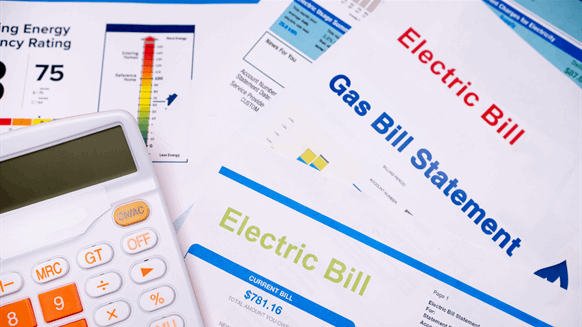The UK’s energy services regulator has further reduced its price cap to reflect recent falls in wholesale prices.
Meanwhile, to safeguard energy suppliers, the Office for Gas and Electricity Markets (Ofgem) has also increased the profit margins allowed.
The maximum annual amount that providers can charge the average household paying by direct debit falls to $2,419.3 (GBP 1,923) from October to December, from $2,609.3 (GBP 2,074) from July to September and 4,126 $.6 (GBP 3,280) in June, according to a press release. by Ofgem on Friday.
“The change will bring the average dual fuel energy bill below £2,000 [$2,516.2] a year for the first time since April 2022, saving households an average of £151 [$190] the previous quarter,” the office said.
The figures are based on today’s typical household consumption rate, or 2,900 kilowatt hours (kWh) of electricity and 12,000 kWh of gas per year.
“The decline, the lowest level since October 2021, reflects further declines in wholesale energy prices as the market stabilizes and suppliers return to a healthier financial position after four years of losses,” Ofgem said.
Prepaid meter (PPM) users and consumers who pay with standard credit or subscribe to Economy 7 also see decreases in their energy bills from October to December.
PPM customers have annual energy bills of up to USD 2,449.5 (GBP 1,947) from October to December to USD 2,613.1 (GBP 2,077) from July to September. Consumers using standard credit will pay annual charges of up to $2,581.6 (GBP 2,052) from October to December and $2,781.7 (GBP 2,211) from July to September.
Economy 7 subscribers have maximum annual bills of $1,633 (£1,298) from October to December from $1,761.3 (£1,400) from July to September. Economy 7 is an electricity tariff that offers cheaper off-peak rates and higher off-peak rates.
The downward trend has continued since the annual price cap for typical households using direct debit peaked at $5,383.4 (£4,279). “However, it remains well above the average before the energy crisis took hold in 2021 and the market remains volatile,” Ofgem said. The price cap has been in effect since January 2019.
Ofgem chief executive Jonathan Brearley said in a statement about the latest decrease: “It is welcome news that the price cap is continuing to fall, but we know that people are struggling with the wider challenges of the cost of life and I can offer no certainty that things will get any easier this winter.”
“That’s why we’ve introduced new measures to support consumers, including reducing costs for pre-paid meters and introducing a PPM code of conduct that all suppliers must comply with before re-installing any mandatory PPM”.
The code, published on April 18, prohibits involuntary installations in high-risk households, such as those that require a continuous supply of energy for health reasons and those that have people over 85 as members without any other support in the house. It also asks for a credit of $37.7 (GBP 30) per meter or an equivalent non-disconnection period for involuntary PPMs.
“In the longer term, Ofgem aims to permanently end the PPM premium, where prepaid customers are charged more than those paying by direct debit to cover the additional costs and resources required by suppliers to supply energy via PPM,” it said in Friday’s announcement. “A consultation is underway with the aim of ‘levelling’ these permanent charges by April 2024 to coincide with the end of government support currently in place through the Energy Price Guarantee” .
Safeguard for energy suppliers
Ofgem simultaneously announced that it has increased earnings before interest and tax (EBIT) by $12.6 (£10) per customer to “enable businesses to better cover their costs, attract investment and maintain financial stability by protecting consumers in the future.”
“Raising the EBIT allowance from its current rate of 1.9% to 2.4% from 1 October will mean an average increase of £10 in annual bills. £8 [$10.1] this will cover the costs to consumers arising from an additional requirement for suppliers to have sufficient funds to meet their renewable obligations, protecting consumers from additional costs should a supplier fail,” he said.
“The EBIT rate, which is well within international norms for energy retail profits and lower than most other business sectors in Britain, will also be altered from a ‘flat rate’ to a more flexible which tracks the price cap level and is reduced as low as 1.75 percent in case of another price hike in the wholesale market.
“This would prevent suppliers from making excessive cash profits in a high-cost market.”
Brearley said with the EBIT adjustments companies should have no excuse not to support their customers this winter.
“There are signs that the financial outlook for suppliers is stabilizing and that reasonable profits are returning,” the Ofgem boss said.
New code of conduct
Brearley added that a new code of conduct will be implemented in the winter.
“This code will ensure that there are clear expectations of behavior from providers, particularly for their most vulnerable consumers, who providers should reach out to proactively, with compassion and understanding,” said Brearley, who also wrote to providers on July 4 warning them that they would not increase returns to investors. at the expense of consumers.
Ofgem said it “understands that while suppliers cannot control wholesale prices or fix the wider cost of living pressures affecting their customers, now the market has stabilized they must continue improving customer service and ensuring overall support is accessible, responsive and understanding. including allowing time to make payment arrangements and directing customers to further support and advice.”
To contact the author, please email jov.onsat@rigzone.com


